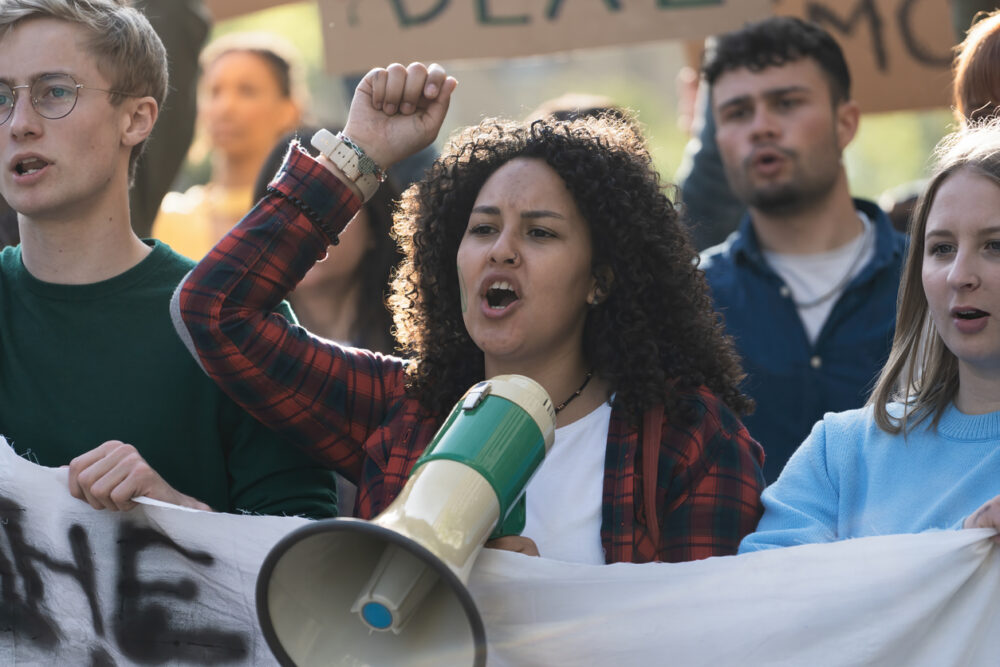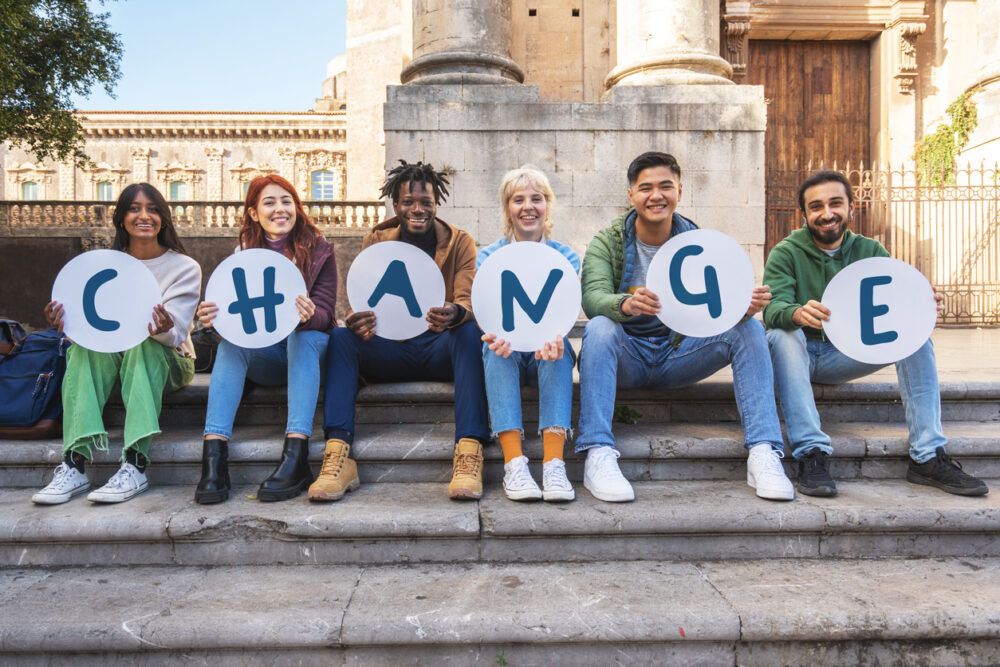Gen Z won’t sit back while the world burns—they’re loud, organized, and relentlessly hopeful.

They’ve been dismissed, memed, and misunderstood, but Gen Z is stepping into activism with a clarity and conviction that’s hard to ignore. They’re showing up not just online, but in the streets, in school board meetings, and at the ballot box. They’re blending digital savvy with bold purpose—and they’re not waiting for permission.
This generation isn’t asking for change. They’re demanding it.
1. Climate justice is more than a movement—it’s a necessity.

Gen Z knows their future is on the line, and climate change isn’t a vague concept—it’s a daily threat. They’re not just worried about melting glaciers; they’re calling out fossil fuel companies, voting for green candidates, and refusing to let governments or corporations off the hook. Their version of environmentalism is deeply intersectional, tying together racial justice, economic equity, and indigenous rights.
They’re rallying for sustainable fashion, boycotting polluting brands, and pushing for climate education in schools. It’s not just about recycling; it’s about redefining systems. Greta Thunberg may have put Gen Z on the map, but the movement has grown far beyond one face. This generation wants climate justice now—and they’re prepared to keep shouting until someone listens.
2. Mental health isn’t a taboo—it’s a shared mission.

Gen Z talks openly about anxiety, depression, and trauma in ways older generations often avoided. They’ve turned TikTok, Instagram, and Discord into platforms for collective healing and advocacy. They challenge stigma by sharing their stories, encouraging others to get help, and calling out toxic workplace and school cultures that ignore mental wellness.
They want access to therapy, better support in schools, and policies that treat mental health with the same urgency as physical health. The conversation isn’t just about surviving—it’s about thriving. Gen Z isn’t afraid to call out outdated ideas about “toughing it out.” For them, advocating for mental health is revolutionary, and deeply personal.
3. Racial justice isn’t optional—it’s core to everything.

This generation grew up watching movements like Black Lives Matter reshape public discourse. They’ve seen how racism plays out in schools, the legal system, healthcare, and media—and they’re refusing to ignore it. Gen Z calls out microaggressions, demands diverse representation, and pressures institutions to dismantle long-standing inequities.
They’re not waiting for leaders to fix it—they’re organizing protests, creating petitions, and making their own platforms when needed. For Gen Z, racial justice isn’t just a checkbox issue. It’s woven into how they see every cause, from climate to education to policing. They’re not looking to be the “woke” generation—they’re trying to be the one that finally makes justice real.
4. Gun reform is personal—and they won’t be silent.

Mass shootings have been a constant backdrop to Gen Z’s lives. School lockdown drills and headlines about gun violence are their norm. That’s why their activism around gun reform hits with urgency and fury. They’ve watched politicians stall while classmates die, and they’re tired of the cycle of thoughts and prayers without action.
Many have turned their trauma into protest. Think March for Our Lives, led by students who experienced gun violence firsthand. Gen Z wants background checks, red flag laws, and a complete rethinking of what “freedom” really means. They’re not anti-rights—they’re pro-life in the truest sense. And they’re not waiting to be victims—they’re becoming changemakers.
5. LGBTQ+ rights are human rights—and Gen Z won’t back down.

Gen Z is the most openly queer generation in history, and their activism reflects it. They advocate for trans rights, inclusive school policies, and media representation that goes beyond stereotypes. They’ve made pride personal, political, and intersectional. If someone tries to roll back progress, Gen Z doesn’t just resist—they mobilize.
Their fight includes protecting healthcare for trans youth, pushing for accurate sex education, and challenging anti-LGBTQ+ legislation across the country. They’ve turned social platforms into hubs for queer visibility and support. For Gen Z, being an ally isn’t enough—they expect action, advocacy, and accountability. And they’ll call out silence just as loudly as hate.
6. Reproductive freedom is non-negotiable.

With Roe v. Wade overturned, Gen Z stepped into the fight for reproductive rights with fierce urgency. They understand that abortion access, birth control, and healthcare equity are all tied together. They’re rejecting the shame, silence, and outdated narratives around reproductive choices.
Gen Z is donating to abortion funds, showing up at rallies, and challenging the lawmakers who want to strip away bodily autonomy. Their advocacy isn’t limited to abortion—it includes sex education, period equity, and breaking the stigma around reproductive health. They’re pushing for policy, but they’re also changing culture. For them, it’s not just about rights—it’s about power and control over their own bodies.
7. Student debt is a crisis—not a character flaw.

Gen Z inherited a broken education system with soaring tuition costs and predatory lending. They’re not just frustrated—they’re angry. They know that their degrees often come with crippling debt and uncertain job prospects. And they’re pushing back hard.
Activists in this generation are demanding loan forgiveness, free public college, and systemic reform. They’re questioning why education has become a luxury and challenging the myth that debt is a personal failure. Social media has amplified their message: higher education should open doors, not chain people down. Gen Z wants a future where financial freedom is possible—and they’re not afraid to demand it.
8. Worker rights are back—and Gen Z is leading the charge.

This generation isn’t satisfied with toxic hustle culture or minimum-wage jobs that barely cover rent. They’re walking out, organizing unions, and documenting workplace abuses in real time. Whether it’s Starbucks baristas or retail workers, Gen Z is standing up for fair treatment, better pay, and basic dignity.
They’re not scared to say no to burnout. They want flexibility, mental health benefits, and jobs that don’t kill their souls. And they’ll quit if they don’t get it. Their approach to labor is deeply influenced by pandemic shifts and economic instability. Gen Z isn’t just clocking in—they’re rewriting the rules of work.
9. Digital privacy isn’t a luxury—it’s a right.

Gen Z knows that every click, like, and scroll is tracked. Growing up online, they’ve developed a sharp awareness of surveillance, data breaches, and how personal info gets sold without consent. Their activism around digital privacy isn’t abstract—it’s urgent.
They’re demanding stronger data protection laws, holding tech companies accountable, and creating tools to help users understand what’s being collected. Their fluency in digital spaces makes them uniquely equipped to lead this fight. For Gen Z, privacy isn’t just about hiding—it’s about reclaiming autonomy in a hyper-connected world. They want tech to work for them, not exploit them.
10. Disability rights are getting long-overdue attention.

Gen Z is making disability activism more visible, inclusive, and intersectional. They’re amplifying voices that have long been ignored and pushing for accessibility in schools, workplaces, and public life. From captions on TikToks to calling out ableist language, they’re integrating advocacy into everyday actions.
They don’t see disability as a niche issue—it’s part of how they build inclusive communities. They challenge tokenism, demand authentic representation, and support policy changes that improve real lives. Whether disabled themselves or acting as allies, Gen Z is breaking down stigma with compassion and clarity. They’re proving that accessibility is not a bonus feature—it’s a basic right.
